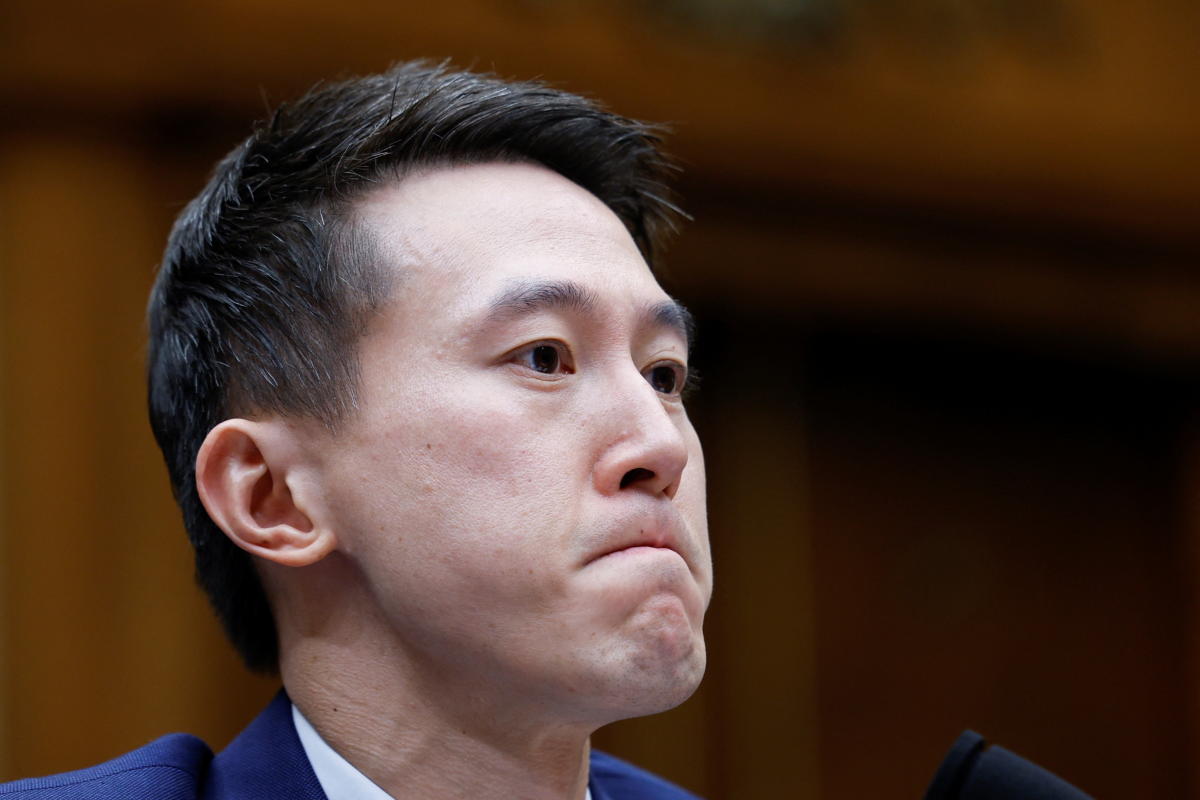TikTok is making two emergency appeals to save its social media app from a countrywide ban — one before the Supreme Court and the other to President-elect Donald Trump.
Neither is guaranteed to work.
On Monday the Chinese social media company filed an exigent request with the US Supreme Court, asking it to block enforcement of a federal law signed by President Biden in April that effectively bans the app on Jan. 19 unless it is sold to a US owner.
That same day, TikTok’s CEO Shou Zi Chew reportedly met with Trump at his Mar-a-Lago club in Palm Beach, Fla.
The president-elect’s transition team did not respond to a request for more information about the meeting or for the incoming administration’s current position on the ban.
TikTok also did not respond to a request for details concerning the meeting.
Trump in September suggested in a social media post that he would “save TikTok” and prevent federal law enforcement from shuttering the app. The position was an about-face from his first administration policy that sought to ban TikTok by way of an executive order in 2020.
This week he said at a Monday press conference that “I have a warm spot in my heart for TikTok” and noted that “we’re taking a look at it.”
In the event that the law remains untouched, and without any presidential delays, it would take effect the day before Trump takes office on Jan. 20.
Even after taking office, however, Trump may not hold enough power to save TikTok from the law’s impact.
One avenue for Trump could be to direct the Justice Department to refrain from prosecuting suspected violations. However, mobile app store providers like Apple and Google that host TikTok could still eventually face civil penalties if they violated the law.
Technically, the statute makes it illegal for individuals and businesses to distribute or host the app.
Legal experts say Trump could also try pushing Congress to repeal the law, try delaying it from taking effect, or even take advantage of language that leaves it up to the president to confirm TikTok’s divestiture.
“Congress explicitly gave the president authority to certify that a divestiture has taken place,” James Grimmelmann, a law professor at Cornell Law School and Cornell Tech, told Yahoo Finance. “So TikTok could divest, or Trump could certify that TikTok has divested, whether it’s true or not.”
That wouldn’t stop Congress from eventually revising the statute’s language, however. Under such a threat, Grimmelmann said, TikTok may decide to make a deal.
“Maybe with its back to the wall, TikTok and the Chinese government would be more willing to agree on a compromise.”
As for Congress doing away with the law, Grimmelmann said it’s “extremely unlikely.”
University of Minnesota law professor Alan Rozenshtein said if Trump were to broadly interpret the law by certifying some some form of divestment that isn’t a complete sale to a US owner, it could frustrate lawmakers. But lawmakers, he said, would have no legal authority to sue.
One of the very few parties with standing would be a competing social media company, like Meta, or an app host or provider like Apple or Oracle, Rosenshtein said.
Meta CEO Mark Zuckerberg, “could say, ‘hey I’m upset…because you’re dealing in a way with one of my rivals that hurts me, illegally.'”
Delaying the law’s enforcement, for now, depends on the Biden administration and the nation’s highest court.
A federal appeals court permitted the president to grant a 90-day extension, but only if TikTok’s parent company ByteDance has made progress in lining up a buyer. So far, ByteDance has said it would not sell the app.
TikTok’s Supreme Court request to pause enforcement of the ban is likely to be taken up on the court’s so-called “shadow docket.”
Nicknamed for its lack of transparency, the docket refers to the court’s pool of cases that request urgent, last-minute decisions.
That urgency often means there is insufficient time for the court to take a case through regular procedures, including arguments and written decisions that spell out the rationale for rulings.
The court could decline to take up TikTok’s requests altogether. It is empowered to deny, without explanation, both TikTok’s request to block enforcement of the law and its request to review the appellate court’s ruling.
The Supreme Court could agree to review the appeals court decision, which legal experts say would likely come with a grant of TikTok’s request to hold off on enforcing the ban.
In that case, the court would be expected to issue a decision before its term ends in June or July of 2025.
The case landed before the Supreme Court after the full judicial panel for the District of Columbia’s federal appeals court declined to take up TikTok’s nearly identical request last week.
A panel of three judges for the court concluded that the law sought to protect free speech in the US “from a foreign adversary nation” by limiting that adversary’s ability to gather data on people in the US.
In its petition to the Supreme Court, TikTok argued that Congress passed the divestment law for a different reason than the justification stated in lawmakers’ deliberations.
“It targeted TikTok based on disagreement with the substance of the content posted by TikTok’s users, and alleged editorial choices by TikTok in disseminating that content,” the company said.
It also argued that the Chinese-owned company’s editorial choices are entitled to constitutional speech protections regardless of whether Congress deems content on the platform as foreign propaganda.
Alexis Keenan is a legal reporter for Yahoo Finance. Follow Alexis on X @alexiskweed.
Click here for the latest technology news that will impact the stock market
Read the latest financial and business news from Yahoo Finance
